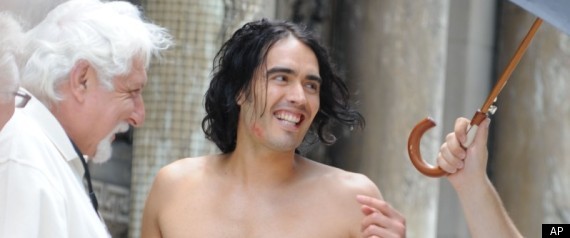
As Arthur, Russell Brand is an exquisitely dressed, charming, androgynous dandy. The sole heir to a massive corporate fortune, he seems happy to drink his Maker's Mark, play with his electric trains, and gallivant about town until his loveless mother, thinking only for the success of the family company, threatens to cut him from the family purse strings unless he agrees to marry the humorless daughter of a self-made millionaire contractor from Pittsburgh (played by Nick Nolte).
Terrified by the idea of life without a billion dollar fortune, Arthur agrees to the marriage, and drinks his way inexorably towards it until one day when he bumps into a "radiant stranger" in Grand Central Station -- and falls in love with her immediately. Naomi, the apple of his droopy eye, is a simple girl from Queens who wants to be a writer but for the moment is leading unofficial tours of New York City in order to feed her father, who is ill.
The movie's writers, Peter Baynham and Steve Gordon, refused to give Naomi a single funny line. For a movie that is supposed to make us laugh, she's an irritatingly self-righteous character. When Arthur offers to fly her to Italy in a private jet, she says she'd rather eat Spaghettios in her father's tiny kitchen instead, and that's exactly what they do. Naomi has a deep and abiding love for the priceless things in life, like admiring architecture and walking in Central Park. But her disdain for things that cost money is its own flavor of snobbery.

Brand on the set of Arthur in New York City in July (AP Photo/Darla Khazei)
In fact, the movie relies on the pleasures that excessive wealth provides to entertain the audience even while it tries to teach us a lesson about how being rich poisons your soul. To illustrate: Arthur initially wins Naomi's heart by performing an act of incredible extravagance. He rents out Grand Central Station for an hour so that the two can eat dinner (served by a waiter in a tuxedo) while professional acrobats perform graceful flips on trampolines placed under the great hall's marble arches.
The movie Arthur tries to woo its audience in the same way that the character Arthur tries to woo Naomi: by trying wholeheartedly to amuse and astonish us with the expensive toys it purchased to populate Arthur's bedroom, from his floating magnetic bed to his gold-plated Blackberry to his British-phone-booth-fish-tank. And the casual references to "the recession" (understood here only as something that poor people must endure) are a lot less interesting than Arthur's fancy toys.
The movie gets all its laughs by making fun of how clueless rich people are compared to the rest of the world. For example, when Arthur picks up a weekly pill organizer at Naomi's house - -the kind that reads SMTWTFS -- he tries to pronounce it phonetically, apparently not understanding why one day would have a different name than any other. ("What's wrong with him?" the kid sitting next to me whispered to his older brother, who replied knowingly, "He's retarded.")
But the naïveté of the rich people in Arthur is by far their best quality. The movie's notions of rich and poor are identical to its notions of good and evil. Rich people are cynical, cranky, immoral, and selfish (in short, they're doomed); and everyone else -- the "regular folk" -- are portrayed without exception as humble, wise, stoic, and loyal. What else can you expect from a movie that defines the poor, in a failed attempt at poignancy, as "people who have to wait in the rain for a bus that takes them to a job they have to work every day in order to take a holiday from those jobs"?
Finally, Arthur ditches his marriage to the unrepentantly horrible millionaire's daughter, tears off his tuxedo, and runs half-naked to Queens to declare his undying love for Naomi. Time passes, and the next time we see him, he's donned a cabbie hat and a leather jacket -- Hollywood's clichéd idea of what an "everyday guy" wears in New York.
Movies like this, which aren't exactly on the level of, say, A Streetcar Named Desire, are meant to entertain us. When they try to provide enlightening commentary on things as complex as recession economics and the malaise of the upper class, it leaves us feeling a little down and out.